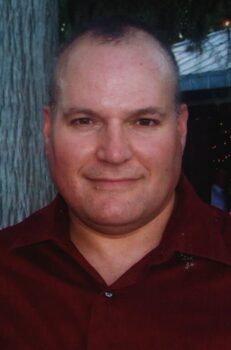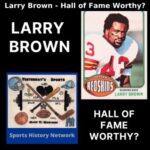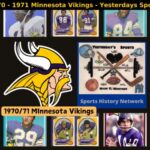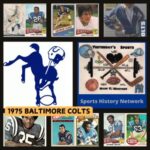Although I was a Dallas Cowboys fan as a young boy, I couldn’t help but root for the Giants and Jets, unless they were playing the Cowboys. After all, I grew up in Bloomfield, New Jersey, just 30 miles from Shea Stadium, 20 miles from Yankee Stadium, and 8 miles from Giants Stadium in the Meadowlands.
I also couldn’t help feeling sorry for Jets fans (my wife’s whole family is Jets fans).
The New York Jets were one of the eight original AFL teams to join the new league in 1960, but they weren’t the Jets yet; they were the New York Titans. Their head coach was Sammy Baugh, the legendary quarterback for the Washington Redskins from 1937 to 1952.
LISTEN ON YOUR APP OF CHOICE
From Titans to Jets: The Early Years
The Titans played their first season at the Polo Grounds. The stadium was old, but they had it all to themselves. The last team to use it, the New York Baseball Giants, moved to San Francisco in 1958. The Titans finished the 1960 season with a 7–7 record. Receiver Art Powell, guard Bob Mischek, and linebacker Larry Grantham made the All-Pro team.
They finished the 1961 season with the same 7–7 record. Quarterback Al Dorow, fullback Bill Mathis, guard Bob Mischek, linebacker Larry Grantham, and cornerback Dick Felt made the Pro Bowl. Mathis, Mischek, and Grantham also made All-Pro.
1962 saw a new coach in Clyde ‘Bulldog Turner’, but the team regressed and finished the season with a 5–9 record. Running back Dick Christy, Bob Mischek, and Larry Grantham made the Pro Bowl. Grantham was also an All-Pro.

The Titans changed their name to the Jets in 1963. They also had a new coach in Weeb Ewbank and would play in the brand-new Shea Stadium. But the losing continued, as the team finished with a disappointing 5–8–1 record. Bill Mathis, receiver Bake Turner, and Larry Grantham made the Pro Bowl. Grantham made All-Pro again.
The Jets finished the 1964 season with the same 5–8–1 record, their third losing season in a row. Rookie fullback Matt Snell, tackles Winston Hill and Sherman Plunkett, and safety Dainard Paulson and Larry Grantham made the Pro Bowl. Grantham made the All-Pro team for the fifth year in a row.
The Jets had a new quarterback in 1965, in #1 draft choice, Joe Namath from the University of Alabama. But again, the Jets finished the season with a 5–8–1 record. Receiver Don Maynard, Joe Namath, and Dainard Paulson made the Pro Bowl. After four losing seasons in a row, the Jets broke even in 1966, finishing the season at 6–6–2. Receiver George Sauer, running back Matt Snell, tackle Sherman Plunkett, and defensive end Verlon Biggs made the Pro Bowl.
After seven years in the league, the Jets had yet to have a winning season, but that would change in 1967. After ten games, the Jets were in first place in the Eastern Division with a 7–2–1 record, but they lost three of their last four games and finished the season in second place with an 8–5–1 record. Joe Namath, Don Maynard, Verlon Biggs, and George Sauer made the Pro Bowl, as did tight end Pete Lammons and offensive tackle Winston Hill. George Sauer also made the All-Pro team.


Super Bowl III: The Namath Guarantee
The Jets finished the 1968 season with an 11–3 record and would face the 13–2 Oakland Raiders in the AFL Championship. The Jets won a hard-fought game 27–23 and would now play the NFL Champion Baltimore Colts in Super Bowl III. The Colts were heavily favored to win, and with good reason. They lost only one game the entire season and avenged that loss in the NFL Championship with a 34–0 thrashing of the Cleveland Browns.
But the Jets weren’t exactly chopped liver. They only lost three games and defeated the 1966 AFL Champion KC Chiefs and the 1967 AFL Champion Oakland Raiders. They also beat the 9–5 SD Chargers twice. The Jets defeated the Colts 16–7 in what is still regarded as one of the biggest upsets in Pro Football history. Joe Namath won the Super Bowl MVP and AFL MVP.
Ten Jets made the Pro Bowl. On offense, guard Dave Herman, tackle Winston Hill, running back Emerson Boozer, Joe Namath, George Sauer, and Don Maynard. On defense, defensive ends Gerry Philbin and Verlon Biggs, defensive tackle John Elliot, and middle linebacker Al Atkinson. Namath, Sauer, and Philbin also made All-Pro.

The Jets went into the 1969 season with high hopes of returning to the Super Bowl to defend their title. They finished the regular season with a 10–4 record and played the Chiefs in the playoffs. It was a tough defensive battle, but the Jets came up short, losing 13–6.
Joe Namath, Matt Snell, Don Maynard, Winston Hill, Dave Herman, George Sauer, Larry Grantham, John Elliot, and Gerry Philbin made the Pro Bowl. Namath won the AFL MVP award again, while Philbin, Elliot, Maynard, and Snell made the All-Pro team.
Injuries Spell Doom For 70s
Things couldn’t have gone any worse for the Jets in 1970. Injuries from the get-go besieged them. Matt Snell ruptured his Achilles tendon in game three, and Namath broke his wrist in game five. The Jets finished the season with four wins and ten losses.
Only two players, Winston Hill and John Elliot, made the Pro Bowl. As a side note, Snell never recovered from the injury. Although he hung on for three more seasons, his career was essentially over.


In a 1971 pre-season game against the Lions, Joe Namath attempted to make a tackle after a fumble recovery by Detroit. He missed the tackle, and while lying on the ground, he was speared in the knee by a Lions linebacker. Namath required surgery, and he didn’t play again until week eleven.
Week 13 of that season was a memorable game for my brother and me because we went to Shea Stadium to see the game. It was our first time seeing an NFL game live and in person. The Jets beat the Patriots 13–6. Rookie Jim Plunkett was the starting quarterback for the Patriots.
Rookie Jim Plunkett was the starting quarterback for the Patriots. Joe Namath played the entire game for the Jets but only threw 12 passes. Rookie running back John Riggins carried the ball 24 times for 91 yards and scored the game’s only touchdown. The Jets finished the season with a 6–8 record. Winston Hill was the only Jets player to make the Pro Bowl.
The Jets were 5–2 at the halfway mark of the 1972 season, and hopes were high that they could make the playoffs as a wild-card team. But they lost five of their next seven and finished at 7–7. Joe Namath was voted Comeback Player of the Year and made the Pro Bowl. Winston Hill and tight-end Rich Caster also made the Pro Bowl.
1973 got off to a bad start with Namath separating his shoulder in a week two win against the Colts. He returned in week ten, but by then, the Jets were out of playoff contention and finished the season with a 4–10 record. Only Winston Hill and receiver Jerome Barkum made the Pro Bowl.
The Jets had a new coach in Charley Winner, and Namath started all fourteen games in 1974 and won his second Comeback Player of the Year Award. Rich Caster made the Pro Bowl. The Jets were 1–7 after eight games but won their next six to finish 7–7. Maybe there was hope for 1975.
The Jets started the 1975 season with two wins and one loss. They then lost ten of their next eleven games. Charley Winner was fired as Head Coach after a 52–19 loss to the Colts in week nine. They also lost 43–0 to the Dolphins in week five. Interim coach Ken Shipp didn’t fare much better, as the Jets lost to the Cardinals 37–6 in his first game. Fullback John Riggins and tight end Rich Caster made the Pro Bowl.

1976 was a train wreck for the Jets. Lou Holtz was the new Head Coach, and he resigned before the season’s final game. The Jets suffered some embarrassing losses: a 46–3 loss to the Broncos, a 41–7 loss to the Patriots, and a 42- 3 loss to the Bengals. They finished the season with a 3–11 record. Eight years earlier, the Jets were the World Champions; now, they were the laughingstock of the NFL. Not one player from the team made the Pro Bowl.
1977 started with a new coach and quarterback, but the losing continued. Walt Michaels was the head coach, and Richard Todd was the quarterback. Joe Namath played his final season with the LA Rams. The Jets suffered three shutouts during the season, finishing at 3–11 for the third year in a row. No Jets player made the Pro Bowl for the second year in a row.
The Jets finally improved in 1978, finishing the season with an 8–8 record. Second-year receiver Wesley Walker made the Pro Bowl and All-Pro. The Jets repeated their 8–8 record in 1979, and offensive tackle Marvin Powell made the Pro Bowl and All-Pro. After two 8–8 seasons in a row, Jets fans had high hopes for 1980, but the team returned to its losing ways and finished with a disappointing 4–12 record. Marvin Powell was the only Jet to make the Pro Bowl team.
The Sack Exchange Era
The Jets started the 1981 season by losing to Buffalo 37–0 and then lost their next two games. Same old Jets! But it wasn’t the same old Jets after all. They won ten of their next thirteen games to finish with a 10–5–1 record before losing to the Bills in the playoffs.
It was the team’s first winning season since 1969, and their famed “Sack Exchange Defense” led the league with 66 sacks. Center Joe Fields and Marvin Powell made the Pro Bowl, along with defensive ends Joe Klecko and Mark Gastineau. Powell and Klecko also made All-Pro.


The 1982 NFL season was cut short by a players’ strike. The Jets played nine regular-season and three postseason games, finishing up with an 8–4 record. Three of their four losses came at the hands of the Miami Dolphins, who defeated the Jets 14–0 in the AFC Championship game.
Head Coach Walt Michaels unexpectedly resigned just 17 days later and was replaced by Joe Walton. Receiver Wesley Walker made the Pro Bowl, while running back Freeman McNeil, center Joe Fields, tackle Marvin Powell, and defensive end Mark Gastineau made the Pro Bowl and All-Pro.


After two successful seasons in a row, Jets fans had high hopes for the 1983 season. However, they were let down again, as the team went 7–9. Marvin Powell and Joe Klecko made the Pro Bowl, while Mark Gastineau made the Pro Bowl and was an All-Pro.
The 1984 Jets had a new starting quarterback in Pat Ryan after Richard Todd was sent packing to New Orleans. They also began playing in Giants Stadium, leaving Shea Stadium behind. However, the quarterback and stadium change didn’t change their record, as the team finished at 7–9 again. Freeman McNeil and Joe Klecko made the Pro Bowl, while Mark Gastineau made the Pro Bowl and All-Pro.
The Jets started 1985 with Ken O’Brien at quarterback and lost to the Raiders 31–0 in the season opener, but then bounced back the following week by destroying the Buffalo Bills 42–3.
Then they won six of their next seven games, and their 7–2 record had them sitting atop the AFC Eastern Division. They ended the season with an 11–5 record but lost their playoff game to the Patriots 26–14. Freeman McNeil, Ken O’Brien, Mark Gastineau, Joe Klecko, and linebacker Lance Mehl made the Pro Bowl. Klecko also made All-Pro.


NY vs. NY Super Bowl?
After eleven games of the 1986 season, the Jets’ record was 10–1. Could this be the year? After seventeen years of frustration, the Jets had a good chance of going to the Super Bowl. Jets fans dreamed of a New York vs. New York Super Bowl (the Giants’ record stood at 9–2).
The Giants went on to win the remainder of their games, including the Super Bowl. The Jets got blown out 45–3 on a Monday Night game to the Dolphins in week twelve and never recovered. They lost their next four games, none even close, before beating the Chiefs in the Wild Card Playoff. They lost to the Browns in overtime the following week, and the season was over. Tight end Mckey Shuler made the Pro Bowl, while receiver Al Toon made the Pro Bowl and All-Pro.
The Jets started the 1987 season 2–0, but all NFL games in week three were canceled due to another player’s strike. The next three games were played with replacement players. The replacements went 1–2, giving the Jets a 3–2 record before the regular players returned. They won only three of the next ten games to end the season at 6–9. Only Al Toon made the Pro Bowl. After starting the 1988 season with a 28–3 loss to the Patriots, the Jets won their next two games by a combined score of 68–6.
But the rest of the season was more of the same old Jets. They ended with an 8–7–1 record and out of playoff contention. Al Toon, Mickey Shuler, and defensive back Erik McMillan made the Pro Bowl. McMillan was named Defensive Rookie of the Year.
The Jets had another lousy season in 1989, finishing the year with a 4–12 record. In their last three games, they played like a team that quit on their coach, losing by a combined score of 88–14. Only Erik McMillan made the Pro Bowl. From 1970 to 1989, the Jets had only five winning seasons and appeared in only one Championship Game. The future didn’t look any brighter.


Coaching Carousel and Quarterback Challenges
1990 started with another new Coach, Bruce Coslet, but the losing continued. Their record was 6–10, and not one player made the Pro Bowl. They improved slightly in 1991, going 8–8. Despite the poor record, they qualified for the playoffs but lost to the Houston Oilers. Ken O’Brien made the Pro Bowl.
Whenever the team seemed to improve, they would revert to their losing ways. They finished the 1992 season with a 4–12 record, and no one made the Pro Bowl. After eleven games of the 1993 season, the Jets’ record stood at 7–4 with a good chance to make the playoffs, but in typical Jets fashion, they lost four of their last five games to finish 8–8. Quarterback Boomer Esiason made the Pro Bowl.
The coaching caravan continued in 1994, with Pete Carroll leading the team. Nothing changed. They finished 6–10, and receiver Rob Moore was their lone Pro Bowl selection. Rich Kotite took over as coach in 1995, and things went from bad to worse. The team went 3–13. The only bright spot was that defensive end Hugh Douglas won the Rookie Defensive Player of the Year Award.
The Jets’ record in 1996 was 1–15, their worst season in team history. Rich Kotite lost his job and was replaced by Bill Parcells, who immediately turned the team around. In the first game of the 1997 season, the Jets beat the Seahawks 41–3. After twelve games, the Jets’ record stood at 8–4, but even with a future Hall of Fame Coach, the team collapsed, losing three of their last four games and missing the playoffs. Cornerback Aaron Glenn made the Pro Bowl.
Five games into the 1998 season, the Jets were 2–3, and it looked like another long season, but they went 10–1 in their next eleven games. They won their first division title since 1969 with a 12–4 record and defeated the Jaguars in the playoffs for their seventh win in a row. For only the third time in team history, the Jets would play in a Championship Game. The Jets held a 10–0 lead over the Broncos early in the third quarter, but it wasn’t to be.
They lost 23–10, and the Broncos went on to win the Super Bowl. But other than their 1968 Super Bowl victory, it was the Jets’ best season ever. Quarterback Vinny Testaverde, running back Curtis Martin, receiver Keyshawn Johnson, and cornerback Aaron Glenn made the Pro Bowl. Linebacker Mo Johnson made the Pro Bowl and All-Pro.

But the great season was too good to be true. Quarterback Vinny Testaverde ruptured his achilles tendon in the first game of 1999, and the Jets finished the season at 8–8. At season’s end, Bill Parcells resigned as Head Coach. Al Groh would take over as the new coach.
Keyshawn Johnson and Mo Lewis made the Pro Bowl, while center Kevin Mawae made the Pro Bowl and was an All-Pro. Seven games into the 2000 season, the Jets were 6–1, but as usual, they collapsed, losing six of their next nine games to finish with a 9–7 record and out of playoff contention. Fullback Richie Anderson and Mo Lewis made the Pro Bowl.

2001 began with yet another new Head Coach. Herman Edwards guided the team to a 10–6 record before they were eliminated in the playoffs by the Raiders. Curtis Martin, Kevin Mawae, and defensive end John Abraham made the Pro Bowl. Mawae and Abraham were also All-Pro. The Jets finished the 2002 season with a 9–7 record and qualified for the playoffs, where they destroyed the Colts 41–0. But the following week, they lost to the Raiders 30–10. Kevin Mawae and John Abraham made the Pro Bowl.
As was their history, the Jets could never put together more than two or three good seasons in a row. They fell to a 6–10 record in 2003 wth Kevin Mawae and defensive end Shaun Ellis making the Pro Bowl. In 2004, they reversed their record of 2003, finishing 10–6 and defeating the Chargers in the playoffs before losing the following week to the Steelers in overtime. Curtis Martin, Kevin Mawae, and John Abraham made the Pro Bowl. Martin made All-Pro, and linebacker Jonathan Vilma won the Defensive Rookie of the Year Award.
In 2005, the Jets finished 4–12 and that was the end of Herm Edwards, who Eric Mangini replaced. Jonathan Vilma and cornerback Ty Law made the Pro Bowl. The 2006 Jets went 10–6 before losing to the Patriots in the playoffs. No Jets players made the Pro Bowl, but quarterback Chad Pennington won the Comeback Player of the Year Award.
Following the script of their history, the Jets followed up their 10–6 season with a 4–12 record in 2007. Eleven games into the 2008 season, the Brett Favre-led Jets were 8–3. To no one’s surprise, they lost four of their next five games to finish with a 9–7 record and missed the playoffs. Bret Favre, running back Thomas Jones, center Nick Mangold, guard Alan Faneca, nose tackle Kris Jenkins, and cornerback Darrelle Revis made the Pro Bowl.
The never-ending coaching changes continued in 2009 with Rex Ryan taking over. The Jets had another ho-hum 9–7 season but managed to qualify for the playoffs and surprised everyone by beating the Bengals and Chargers.
For only the fourth time in team history, the Jets were in a Championship game, but they lost to the Colts, and the season was over. Alan Faneca, Shaun Ellis, and offensive tackle D’Brickashaw Ferguson made the Pro Bowl. Nick Mangold and Darrelle Revis made the Pro Bowl and All-Pro.


Future Looking Bright?
Eleven games into the 2010 season, the Jets were 9–2, tied for first place in their division with the Patriots. The Jets had beaten the Patriots in week two, but now came the true test, a Monday Night Showdown with New England. The winner would take sole possession of first place.
If they could win this game, it might give them the confidence to get to the Super Bowl. But as was usually the case, the Jets collapsed big time. The final score was New England 45, New York 3! They lost again the following week to the 6–6 Dolphins.
But they bounced back the following week with an impressive 22–17 win over the 10–3 Steelers. They finished the season with an 11–5 record and then beat the Colts in the playoffs when Nick Folk kicked the winning field goal with no time remaining.
Next up for the Jets were the 14–2 Patriots. Few gave the Jets any chance of winning this game, especially after the 45–3 debacle six weeks ago. But the Jets pulled off a major upset, defeating New England 28–21 and moving on to the AFC Championship Game. They would play the Steelers, whom they had beaten five weeks earlier. It was the first time in the team’s history that they reached the Championship Game two years in a row.
The Jets trailed 24–3 at halftime but came back in the second half to score sixteen unanswered points. It wasn’t enough to win, but it was one of the Jets’ best seasons, and the future looked bright. D’Brickashaw Ferguson, Nick Mangold, and Darrelle Revis made the Pro Bowl. Mangold and Ferguson also made the All-Pro team.
The 2011 Jets went 8–8, and the 2012 Jets finished 6–10. So much for a bright future. Oh, the pain of being a Jets fan! In 2011, guard Brandon Moore, D’Brickashaw, and Nick Mangold made the Pro Bowl, while Darrelle Revis made both the Pro Bowl and All-Pro team. In 2012, safety LeRon Landry and cornerback Antonio Cromartie made the Pro Bowl.
The Jets went 8–8 in 2013, with Nick Mangold and Antonio Cromartie making another trip to the Pro Bowl. Defensive end Sheldon Richardson won the Defensive Rookie of the Year Award. The 2014 season was another disaster, with an embarrassing 4–12 record. Both Richardson and Mangold made the Pro Bowl.


Jets in Recent Memory
Todd Bowles was the new Head Coach for the 2015 season, and he led the team to a 10–6 record, but it was not good enough for a playoff spot. Running back Chris Ivory, receiver Brandon Marshall, defensive end Muhammad Wilkerson, Darrelle Revis, and Nick Mangold made the Pro Bowl.
For Mangold, it was his seventh Pro Bowl selection. From 2016 to 2018, the Jets had a combined record of 14–34; that was the end of Todd Bowles. Defensive end Leonard Williams and safety Jamal Adams were the lone Pro Bowl selections during those three years.
Adam Gase took over as the coach in 2019 & 2020, and the Jets won 9 games while losing 23. Jamal Adams made the Pro Bowl and All-Pro in 2019. Robert Saleh was next up on the Jets coaching caravan. The Jets went 20–36 under Saleh.
Despite the team’s poor 7–10 record in 2022, the Jets did have some standout players. Linebacker CJ Mosley made the Pro Bowl, while defensive end Quinnan Williams and cornerback Sauce Gardner made the Pro Bowl and All-Pro teams. Gardner also won Defensive Rookie of the Year,
Williams and Gardner made the Pro Bowl again in 2023, along with linebackers Jermaine Johnson II and Quincy Williams. Quincy and Sauce Gardner also made All-Pro. After a 2–3 start in 2024, Jeff Ulbrich took over as Head Coach. The Jets finished the season with a dismal 5–12 record.
The Jets have had only two winning seasons in the last fifteen years, and their future doesn’t look bright. In sixty-five years, they have been to only one Super Bowl and have had only nineteen winning seasons. Aaron Glenn will be the Jets’ Head Coach for the 2025 season. He will be the team’s 22nd Coach in its sixty-five-year history.
Why So Much Frustration?
While there are many reasons for the team’s lack of success, let’s start with the absurdity of having a new Head Coach every three years. Or maybe it’s because they never hire the right person.
Only two Jets Coaches left New York with a winning record. Bill Parcells, who coached the team for three years, had a record of 30–20. Al Groh coached the team for only one year and left with a 9–7 record. Both coaches resigned. Although Weeb Ewbank did not have a winning record, he is the only Coach to lead the Jets to a Super Bowl.


Despite the teams mostly losing history, they do have eight Hall of Fame members. (I’m only including those who spent at least six seasons with the team.) John Riggins spent five seasons with the club, but his best years were with the Washington Redskins.
1 -Weeb Ewbank — Head Coach. 1963–1973. Inducted in 1978.
2 -Joe Namath — Quarterback. 1965–1976. Inducted in 1985.
3 -Don Maynard — Wide Receiver. 1960–1972. Inducted in 1987.
4 -Curtis Martin — Running Back. 1998–2005. Inducted in 2012.
5 -Kevin Mawae — Center. 1998–2005. Inducted in 2019.
6 -Winston Hill — Offensive Tackle. 1963–1976. Inducted in 2020.
7 -Joe Klecko — Defensive End, DT, NT. 1977–1986. Inducted in 2023.
8 -Darrelle Revis — Cornerback. 2007–2012, 2015–2016. Inducted in 2023.
Mark Morthier is the host of Yesterday’s Sports, a podcast dedicated to reliving memorable sports moments from his childhood days and beyond. He grew up in New Jersey just across from New York City, so many of his episodes revolve around the great sport’s teams of the 70s for the New York area.
He is also an author of No Nonsense, Old School Weight Training (Second Edition): A Guide for People with Limited Time and Running Wild: (Growing Up in the 1970s)

BOOKS BY MARK MORTHIER
Please Note – As an Amazon Associate I earn from qualifying purchases
More From Yesterday's Sports
Muhammad Ali’s Chin: Knocked Down Only 4 Times
Muhammad Ali’s boxing career is well documented, so instead of...
Read MoreLarry Brown – Is He Hall of Fame Worthy?
A committee member recently asked me my opinion on inducting...
Read More1970s Minnesota Vikings : Would A Better QB Helped Them Win A Super Bowl?
Here’s a question I often hear, especially from Minnesota Vikings...
Read More1975 Baltimore Colts: A Year In Review
From 1957 to 1971, the Baltimore Colts never experienced a...
Read More


